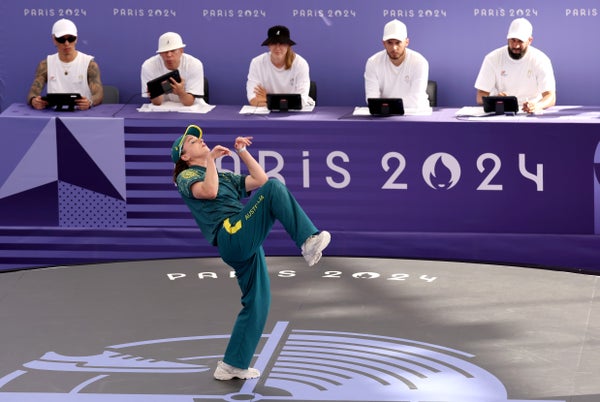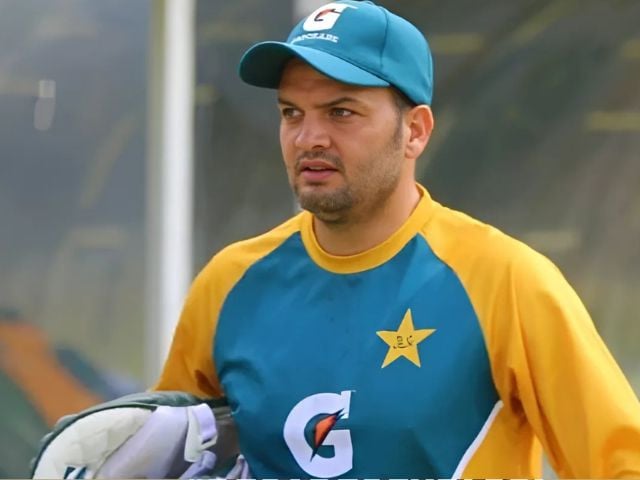September 4, 2024
5 min read
The Olympics Breaking Fiasco Undermined Serious Hip-Hop Artists and Scholars
The “Raygun” Olympics fiasco points to how hip-hop scholarship is at risk of being colonized and undermined in academia

B-Girl Raygun of Team Australia competes during the B-Girls Round Robin – Group B on day fourteen of the Olympic Games Paris 2024 at Place de la Concorde on August 09, 2024 in Paris, France.
In August Australia’s Rachael Gunn, also known as “Raygun,” delivered an Olympics breaking performance more redolent of mockery than mastery of the competitive form better known as breakdancing. Ironically, she may have also made herself the world’s most famous hip-hop artist for that moment, a travesty that hurts real hip-hop artists and furthers damaging stereotypes of Black art.
Hip-hop culture, which includes among its original elements breaking, graffiti art, DJing and emceeing (rapping), has spread worldwide since its origins among Black artists in the early 1970s. Since then it has garnered both popular acclaim and academic interest, as well as criticism heavily influenced by racism, both hidden and overt.
The excessive attention paid to Gunn’s poor performance is tinged with anti-Blackness—the systematic disdain for Black people and cultural forms—that has been likened to minstrelsy. In addition to upstaging the Olympic competition and making a mockery of hip-hop culture, viral news of the debacle has further fueled this anti-Blackness that has, for decades, been weaponized against hip-hop and other Black art.
On supporting science journalism
If you’re enjoying this article, consider supporting our award-winning journalism by subscribing. By purchasing a subscription you are helping to ensure the future of impactful stories about the discoveries and ideas shaping our world today.
I know how this happens because I’ve experienced it personally. I have been a lifelong hip-hop artist. In 2017 I watched news of my doctoral dissertation, a rap album titled Owning My Masters: The Rhetorics of Rhymes & Revolutions, go viral. Much of this attention felt like sincere interest in the work, but some of it proliferated among people who disdained both Black art and Black scholarship. A second wave of such attention came from the same sort of observers when I was hired to an academic position focused on hip-hop at the University of Virginia in 2017. (Given the ubiquity of hip-hop globally, it’s remarkable that it took until that time for a university to establish what was then my role as an assistant professor of hip-hop. I’m now an associate professor of the subject.)
What I’ve learned is that, unfortunately, racist cultural assumptions about hip-hop lead audiences to dismiss its art and scholarship. Misguided assumptions about rap and rappers lead audiences to believe that hip-hop and academic achievements are at odds with one another. Because of this, the novelty of someone earning a Ph.D. by rapping is hard to disentangle from long-held negative stereotypes. These stereotypes are fed by some narrating such occurrences as “unlikely” rather than a product of deliberate exclusion. There is also the history of Black culture and music being co-opted. Institutions like universities and record companies colonize the music. Their “discovery” and “study” become vehicles to confer expertise and make money through a process of whitewashing that removes control of the culture and its products from Black people. William E. Ketchum III, writing for Rolling Stone about the online school for lyricism, Pendulum Ink Academy, highlights a tension I feel: “On one side, if academia is supposed to reflect what’s going on in the real world, hip-hop should be a part of it. But on the other side, when these predominantly white spaces integrate hip-hop into what they’re doing, it often loses the essence of what hip-hop is.”
Gunn is also an academic who reportedly studies breaking. Much of the coverage of her foregrounds her academic credentials. This works to render her ability (or lack thereof) as novelty, giving detractors ammunition to leverage against hip-hop and academia. While the widespread attention may open up potential future publishing opportunities and media appearances for her, it may unintentionally cast negative light on earnest, valuable scholarly explorations of hip-hop cultural forms. Associations with the attention afforded scholars like her are why I expressly didn’t want to become a “hip-hop scholar” by earning a Ph.D.; I wanted to avoid the ways that the term seems to describe some academics who feel encouraged to unquestioningly colonize the culture and try to be its loudest and most visible authorities.
The Root’s Noah McGee noted how some academics excused Gunn’s performance with language in which hip-hop artists—people like me—were considered objects of study, unthinking things, a perpetual problem. McGee noted a response in the Black community: “Some expressed that if she was so educated about the art, why did she go out and make a fool of herself?” My work, and scholarship by others, reveals serious, similar misgivings about hip-hop in academia sanctioning and telling whitewashed stories of America’s history. It’s easy to see the way Gunn’s performance is weaponized against other hip-hop artists; critics have used it to cast aside the hip-hop art form of breaking. While there was plenty of mockery, her absurd routine, which scored no points with any of the Olympic judges, has been amplified to the world as an example of what hip-hop has to offer.
Of course, Gunn has every right to love hip-hop and study the culture. At its best, hip-hop has historically eliminated boundaries rather than creating them. Her performance was so bad, however, that it almost seems laughable to describe the fiasco surrounding her in terms of hip-hop. Judging on that alone, she should never be a global example of it.
Some of her fellow Olympians have extended grace in the face of the polarizing performance. The U.S. Olympic breaker who won the bronze medal, Victor Montalvo, described the attention by saying that “any type of publicity is good publicity” and that “it’s also a good thing” because the viral performance led people to tuning into the rest of the breaking competition. I disagree. Conversations that should be about Black art and hip-hop culture have been focused on a white Australian woman. It would be preferable if the story instead focused more on news reports that it’s possible “there were B-girls in Perth, regional Victoria or rural Brisbane who might have qualified but could not afford to travel to Sydney for the tryouts.”
In 2017 I worried about the potential backlash that might be produced by headlines about my work for good reason. Questions about someone earning a Ph.D. from an American university making hip-hop music, or teaching about it at one founded by a racist president, are warranted. My work prepared me to answer those questions head-on rather than evade accountability about potentially making a mockery of an entire culture. I liken the brutality of these kinds of exploitation of Black culture to an American addiction. The viral attention to Gunn seems to prove it’s a global phenomenon and is, perhaps, a symptom of a more widespread crisis.
Throughout its five decades, hip-hop’s artists have embraced the expectation to “show and prove.” There is no way to demonstrate knowledge, skill and mastery other than to demonstrate it. If it’s dope, it’s dope. If it’s not, you’re not. As an academic who is a hip-hop artist, I fully expect people’s questions, and I also make great efforts to, rather than rely on my academic credentials, let my performance speak on my behalf. For what it’s worth, Rachel Gunn’s viral dance routine speaks volumes on hers.
This is an opinion and analysis article, and the views expressed by the author or authors are not necessarily those of Scientific American.







